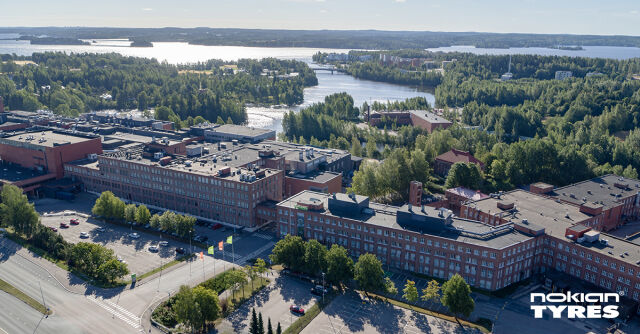Excellent productivity and efficiency at the Nokia factory is achieved through continuous improvement

Nokian Tyres’ factory in Nokia, Finland continues its strong development. Sheltered by red brick walls, the team in Nokia has been refining the tire production piece by piece to peak performance. Last year, productivity and efficiency reached record levels while the amount of waste decreased significantly. These achievements are not coincidental but the result of a philosophy of continuous improvement, where even small changes can have a significant impact and everyone’s contribution matters.
At the heart of smooth work and efficient operation is safety, which has been a key focus area at the factory for years. Although there was a slight dip in safety in 2023, the overall progress has been enormous over the long term.
“In the passenger car tire production, we have managed to reduce accidents at the factory by as much as 65 percent over the past three years. In Heavy Tyres, we have already gone well over a year without accidents,” says Manu Salmi, EVP, Heavy Tyres and Nokia Factory.
Despite the predominantly positive developments in safety, every accident that occurs is one too many.
“For this reason, our goal is to eliminate even minor accidents, identify the factors leading to them, and engage everyone in safety work, for example, by making safety observations. This year, our goal is for each of us to make five safety observations throughout the year.”
Proactivity and continuous development
When developing a safer working environment and improving factory operations, it is essential to act proactively and continuously develop practices. We do not operate as we always have, but boldly consider ways to evolve and grow. The commitment to continuous improvement is evident in the excellent productivity and efficiency of the Nokia factory.
“In the production of passenger car tires, productivity rose last year to an all-time high, and production volume grew by a staggering 150 percent in 2020–2023. Measured in kilograms, this means a growth of over 200 percent. We are now close to the highest volume ever produced at the Nokia factory.”
Heavy Tyres’ production also set a productivity record last year, and its capacity has been gradually increased and will continue to grow.
“Our process management is at a very high level. The more efficient the production process, the greater share of materials can be utilized and the less waste is generated. In this respect too, we achieved an all-time record last year by significantly reducing production waste. Less than 3.5 percent of production of passenger car tires ended up as waste at the Nokia factory, marking a 35 percent improvement during the last three years. In Heavy Tyres, approximately 2 percent of production ended up as waste, which was an all-time record as well,” Manu explains.
At the Nokia factory, employees can participate in a continuous improvement-related Lean training, which includes a Kaizen Promotion Officer (KPO) course that enhances problem-solving methods. In their final projects, the course participants have studied different aspects of the production process and the ways to improve their efficiency. Streamlining the process, automation, and minimizing waste have resulted in considerable savings, even in the millions of euros, as well as improvements in capacity and quality. Efficient processes and flexible operating models allow quick responses to changes in the market and benefit customers. This permits Nokian Tyres to maintain its competitiveness and ultimately drive business growth.
Sharing knowledge and succeeding together
The role of the Nokia factory in Nokia Tyres’ manufacturing network is to develop and manufacture tires for the Nordic countries, as well as to support North America and partly also Central Europe. The factory is a center of expertise in winter tire technology, and one of its special areas of expertise is studding technology.
“Last year, we studded a record number of passenger car tires. With timely investments and increased automation, we have been able to improve efficiency and increase production volumes, and thus meet the demand for studded tires.”
The Nokia factory has a long history and decades of accumulated knowledge worth sharing. We do not need to invent everything ourselves, but we can learn from each other.
“Sharing best practices between our factories, learning from each other, and cooperation are key to continuously improving our performance. We succeed by working together as a team and growing together with our customers,” Salmi says.